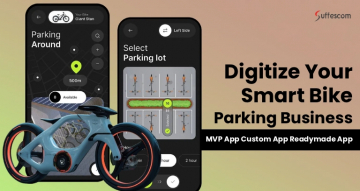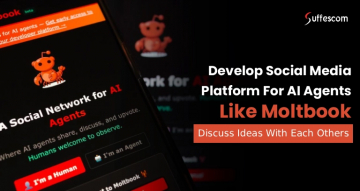AI Parenting App Development: Build Smart Parenting Assistant Apps
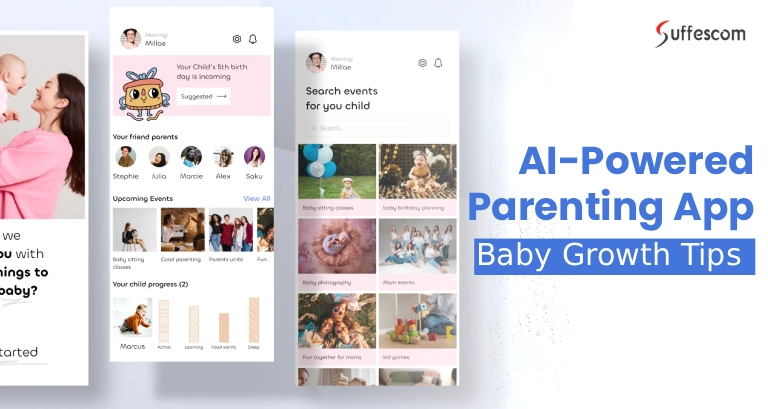
Parenting has always been a combination of happiness and responsibility, but in 2025, there are many more layers of complexity attached to it. Parents are experiencing complications that have not been solved by traditional parenting approaches.
This is where AI parenting apps are becoming game changers. They are not simple reminders but rather smart assistants that evaluate their children’s habits, behaviors, and emotions to better inform parents.
According to the Business Research Company, the parenting apps market is growing fast, expected to reach $2.8 billion by 2029.
Apps with AI-driven features such as child growth tracking, personalized parenting tips, and emotional support are emerging as a lifeline for new parents seeking real-time guidance and peace of mind.
If you’re an entrepreneur looking to build a child development tracking app, you have a huge opportunity to tap into the growing demand for smart parenting solutions.
Let’s break down how these apps work, what makes them different, and why a custom solution can change the game for your business and for families.
What is an AI Parenting App?
An AI parenting app is a mobile or web-based application that uses artificial intelligence, machine learning, and predictive analytics to assist parents in raising their children. Unlike regular parenting apps ,which offer standardized tips, AI apps learn and adapt to every child's unique behaviors.
An AI parenting assistant for child safety possesses the following core functionalities:
- Tracking: Includes sleep, nutrition, screen time, and exercise.
- Parental Guidance: Age-specific, developmental milestone suggestions.
- Predictive Analytics: Identifying issues associated with health or behavior before there is an issue.
- Safety Measures: Real-time alerts with digital or physical safety concerns.
- Wearables Integration: Smart devices integration for real-time updates.
Why AI is Crucial for Modern Parenting?
Children today are growing up in a world of technology. This modern era thus creates opportunities for learning and socializing along with risks of cyberbullying, screen time overuse, and online dangers. Parenting in the face of these challenges requires AI-powered parental control apps that are quickly becoming valuable assets.
The modern parent is responsible for managing a multitude of tasks, from screen time use to keeping school work organized. Using AI can automate many of these responsibilities, simplifying decision making on the part of parents and delivering support and reminders at critical decision points to ease working memory.
AI enables parents to utilize proactive support in recognizing developmental delays sooner. AI systems could record milestones, behaviors, and interactions. This allows for the dissemination of information regarding the child's development. Some of this information might go unnoticed otherwise. Parents can then use that information to seek assistance for significant areas of concern sooner rather than later.
The importance of AI in parenting is massive, as it promotes inclusive parenting by providing personalized solutions for single and working parents. With personalized guidance, AI apps provide every parent with the necessary resources to succeed in today's complex world.
Build AI Parenting Assistant App Today
Empower new-age parents with real-time guidance and smart support features.
Key Features of a Successful AI Parenting App
The real magic of an AI parenting app comes from its features. These are the tools that make life easier for parents:
1. Milestone Tracking
The app helps parents to track their child's developmental progress, such as first smile, first words, and first steps. It adjusts these milestones according to the child's actual age.
2. Daily Logs & Routines
Parents can record their child's daily activities, including sleep times, feeding, play, screen time, and even their mood. Over time, the app shows useful trends like whether the baby is getting enough sleep or has irregular feeding.
3. AI Parenting Assistant Support
Built-in AI provides instant answers to common parenting questions such as "How much milk should a 6-month-old drink?" or "Why does a toddler feel cranky at bedtime?" It gives children specific guidance and helps parents feel supported, especially during odd hours.
4. Age-Based Parenting Tips
The app provides clear suggestions tailored to the child's current age or stage. For example, it is the perfect time to introduce solid foods. These are easy to implement for parents and avoid information overload.
5. Growth Charts and Health Metrics
Parents record information about their child's height, weight, and head circumference during health checkups. The application makes comparisons with WHO or CDC charts to provide pediatric expert advice in your pocket.
6. Family and Caregiver Access
Multiple users can access the same child profile. So, both parents, grandparents, and even doctors can view updates and logs. Everyone stays in sync. This is useful for co-parenting or long-distance families.
7. Reminders for Health and Activities
The app offers suggestions for doctor visits, vaccinations, taking vitamins, bedtime, and even playtime breaks. It saves mental energy for busy parents and ensures that nothing important is skipped from meals.
8. Smart Device Syncing
Parents can use a smart thermometer to collect information on sleep patterns, heart rate, height, weight, and other details. It creates a fuller picture of the child's well-being.
9. AI-powered Child Monitoring
Helps track and monitor health, activity, and screen time as it happens, providing parents with current visibility into their child’s health and behavior patterns.
10. Customized Parenting Advice
AI processes patterns in children’s behavior and provides customized recommendations to make parenting choices easier for parents and to support their children effectively.
11. Growth & Development Monitoring
Tracks emotional, physical, and educational milestones while providing progress reports about whether children are developing appropriately for their age and body-type.
12. Safety & Security Features
Includes location tracking, cyber threat alerts and safe zone alerts, providing parents with real-time monitoring of their child’s physical location and online safety.
13. Smart Alerts
Provides smart alerts related to the child's habits and needs, keeping parents informed, but never spammed with generic or irrelevant alerts.
14. Lives Education Modules
Offers children with interactive tasks and rewards, making learning fun and motivating. Each module is designed as a game experience that helps children to develop essential skills while striving to achieve.
How an AI Parenting Assistant App Makes Parenting Easier?
It can be tough for new parents to manage baby care, work, and other responsibilities. That's where an AI parenting assistant needs. It makes everyday parenting life easier through real-time and personalized support.
From age-specific parenting advice apps that provide developmentally matched guidance to baby development trackers with AI-driven advice, these technologies help minimize uncertainty. For example, the app can alert parents when it's time to introduce solid foods, adjust sleep routines, or track emotional development milestones.
Additionally, features such as family parenting apps with synced accounts enable co-parents and caregivers to stay in sync, enhancing collaboration and minimizing stress.
For companies, providing these tools enhances user retention, particularly when combined with a parent subscription and support app model. With AI-driven insights, parents get curated guidance that adapts to their child, making your product not only beneficial but indispensable.
Why Business Should Build an AI Parenting Assistant App?
Leverage the booming demand for AI powered child support app solutions that offer real-time, data-driven parenting assistance:
1. Fast-Growing Market
Parenting technology is witnessing accelerated growth in adoption, particularly in the post-pandemic era. Parents are increasingly seeking smart solutions to streamline everyday child care activities, monitor child development, and make informed decisions.
2. Real-Time Parenting Support
Timely decisions are required to support the child's development, whether in sleep, nutrition or learning activities. An AI-parent assistant app provides instant, focused guidance to fulfil milestones. By offering real-time tips, reminders, and insights, it helps parents to respond effectively and promote the healthy physical, emotional, and cognitive development of the child.
3. Boost Engagement and Retention Rates
Apps in this category have much better retention since parenting is an everyday, changing requirement. Functions such as tracking baby growth, milestone notifications, and tips based on age make parents come back again and again, driving app usage and brand loyalty.
4. Monetization Potential
Companies can create repeat revenue streams through mechanisms such as premium subscription levels, pay-per-advice expert advice, or bundled AI advice through a parent subscription and support app. The market is extremely monetizable, with parents being happy to spend money on high-quality solutions.
From Idea to Launch: Building a Reliable AI Parenting App Step by Step
Developing an AI parenting assistant app involves multiple critical steps, including understanding user needs and ensuring compliance. Here's how a typical development cycle unfolds:
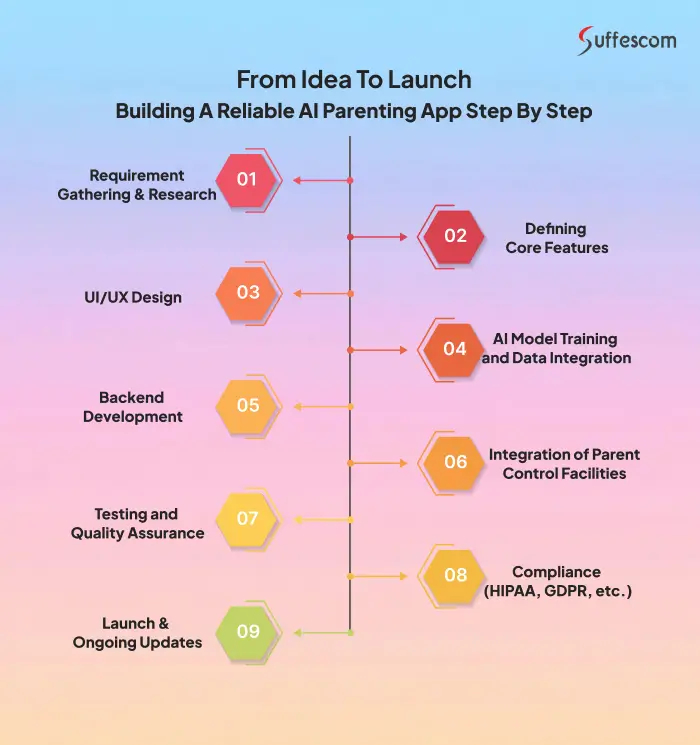
1. Requirement Gathering & Research
The process begins with identifying real-world pain points of modern parents. It analyzes the competing app and performs market research to define the extent of the app. Building user personas for parents and children ensures the app targets all required features, which establishes a strong basis for further development.
2. Defining Core Features
In this phase, the most important features of the app are defined on the basis of research. Features such as real -time activities, material filtering, and screen management are preferable. Define individual dashboards for parents and children. The app meets the requirements of different users and offers analog experiences for each group.
3. UI/UX Design
The UX/UX design focuses on building an intuitive interface that ensures easy navigation for parents and attractive views for children. This stage involves designing a wireframe and a prototype, focusing on simplicity. The determined test design options are performed to validate and improve the user experience. The design should still be attractive to children's ideas, balanced with interactive controls for parents.
4. AI Model Training and Data Integration
The AI model training involves collecting unknown data from different sources to train algorithms, such as app usage patterns and screen behavior. A Natural Language Processing (NLP) model is used for material filtering, while machine learning models analyze user interactions for behavioral conditions. The target app should be equipped with intelligent features according to user behaviour data.
5. Backend Development
The development team builds a robust backend to support features like in-app messaging, push notifications, data syncing, and multi-user accounts. The system also integrates AI algorithms for parenting suggestions, so it’s wise to hire AI developer specialists. Customized settings for parents ensure complete control over the child's digital activities.
6. Integration of Parent Control Facilities
In this phase, the parents' control systems are integrated so that the parents can determine specific limitations. The app contains features such as blocking, screen limits, and scheduled device time. Further, parents are used to control the child’s digital experiences when providing real-time alerts about excessive screen time and exposure to harmful materials.
7. Testing and Quality Assurance
It is necessary to ensure that the app functions properly. This includes unit testing, integration testing, and user acceptance testing to fix the error. Testing across platforms ensures that the app originally works on iOS and Android operating system. Particular attention is paid to recognizing the AI model to ensure accurate monitoring that offers an intuitive user experience.
8. Compliance (HIPAA, GDPR, etc.)
Since sometimes sensitive child data is involved, it's essential to build a compliant system. Whether you're launching in the US, Europe, or globally, the AI-powered child support app must follow strict data privacy protocols.
9. Launch & Ongoing Updates
After launch, user feedback drives iterative updates. You may refine subscription plans, enhance AI training, or expand parent subscription and support app offerings. Regular improvements keep the app relevant and valuable for growing families.
Launch an AI-Powered Child Support App with Us
Create a scalable solution that blends child development tracking with personalized AI tips.
White Label AI Parenting Assistant App: Understand Business Model
Explore proven monetization strategies from freemium to AI-driven upsells in parenting assistant apps that make application stand out:
1. Freemium + Premium Tiers
Offer basic features for free (like baby growth logs or age-based parenting tips), while locking advanced tools. Considering real-time AI advice or expert video sessions, behind a subscription in your parent subscription and support app.
2. Tiered Subscription Plans
Provide monthly or yearly plans according to parenting stages. It includes plans for newborn, toddler, or school-age children evolving with user needs.
3. In-App Purchases
It includes features such as advanced reporting tools, custom notifications, or exclusive parent resources, can be purchased as a shopping app. It allows users to pay for specific features that are useful for a complete membership.
4. Brand Partnerships & Sponsored Content
Allow family brands to sponsor trusted content or product placements in application that ensures value while driving revenue. These partnerships may contain sponsored material or associated marketing in the app.
5. White Label Licensing
Package your app’s backend as a white label AI parenting assistant app and license it to hospitals, parenting brands, or insurance companies.
Tech Stack for AI Parenting App Development
Power up AI-powered child support app with a scalable, secure, and future-ready tech stack that supports real-time personalization and growth tracking.
| Aspects | Tech Stack |
| Frontend | React.js, Flutter, Vue.js, Svelte, Angular |
| Backend | Node.js, Python, Express.js, Java, ROR |
| AI & ML, NLP Frameworks | TensorFlow, PyTorch, OpenAI APIs, GPT, BERT, Dialogflow |
| Security | OAuth 2.0, HTTPS / TLS, AES / RSA Encryption |
| Cloud | AWS, Google Cloud, Microsoft Azure |
| Database | PostgreSQL, MongoDB, Firebase Realtime Database |
Challenges in AI Parenting App Development and How to Overcome Them
Data Privacy Risk
Parents are concerned about their children’s data privacy. To assuage parents’ concerns, strong data encryption processes and monitoring methods are in place offering transparency and complying with data protection regulations (GDPR, COPPA).
Accuracy Limitations
The accuracy of AI predictions can vary greatly depending on the variety of the dataset. To increase the accuracy of prediction models, use large and diverse data sets, and embed real-world user data into the models through continuous retraining processes.
User Adoption Challenges
Parents may be hesitant to use AI for parenting decisions. User adoption may increase if we focus on clearly distinguishing between suggestions for AI and suggestion use for expert content, combine human expert support with AI suggestions, and simplify the user experience.
Development Costs
Building compliant sophisticated AI apps requires careful consideration of how many AI features to include as they may be expensive to develop. Open-source tools may help mitigate development costs, beginning with a more focused MVP, and experimenting with artificial intelligence and slowly scaling both features and compliance.
How Much Does it Cost to Develop an AI Parenting App?
The cost of AI Parenting App development ranges from $10,000-$25,000, based on the project requirements.
| App Type | Development Cost |
| Basic App (limited features) | $10,000 – $15,000 |
| Mid-level App (AI + multi-platform) | $15,000 – $20,000 |
| Advanced App (AI, wearables, smart home, compliance) | >$25,000 |
Emerging Trends in AI Parenting Apps
Parenting apps are changing rapidly, and companies capitalizing on this growth will drive the next wave of innovation. This is what's defining the future of AI-based child support apps:
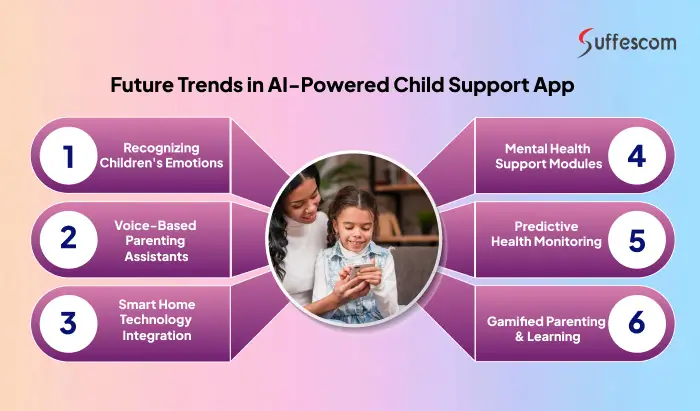
1. Recognizing Children's Emotions
AI will be able to identify a child's mood based on their facial expression or tone of voice. It enables early intervention via tailored suggestions in your baby care and development app.
2. Voice-Based Parenting Assistants
Think Alexa for parenting. It is considered a hands-free AI parenting helper that enables users to ask questions, remind them of something, or record online milestones. It is ideal for busy parents who multitask.
3. Smart Home Technology Integration
AI parenting assistant apps helps coordinate smart home advancements and adjust the temperature, lighting or play relaxing melodies for the children.
4. Mental Health Support Modules
With increasing stress and anxiety among new parents, apps will include guided therapy features, AI-powered check-ins, and mindfulness in their parent subscription and support app packages.
5. Predictive Health Monitoring
AI can analyze behavioral data and health data and provide early indications of problems such as obesity or sleep problems so that parents can intervene at the right time.
6. Gamified Parenting & Learning
AI child safety apps are applying a reward-based methodology to motivate and engage children in learning and daily routines, resulting in fun and innovative experiences and motivation to engage regularly.
How AI Assistants are the Game-Changers for Modern Parenting?
An AI parenting aid app provides immediate, smart support for parents. It is particularly useful for new parents going through baby care, milestones in development, and sleep schedules. Through 24/7 access to expert-level advice, an AI new parent assistant lowers anxiety, addresses typical parenting questions, and keeps them from feeling alone during the important early days.
For companies, it's a high-retention solution that addresses an increasing need for real-time responsive, and personalized digital parenting tools.
Top 5 AI Parenting Apps Transforming Modern Childcare
These leading AI parenting apps demonstrate how innovative technology supports child development, safety, and daily parenting. It inspires businesses to innovate in digital childcare solutions.
1. Parentune
Parentune is a parent society app that uses AI to provide personal advice, expert recommendations and real-time support. It helps parents to join professionals and other parents for guidance on growth, learning, and behavior.
2. Wysa for kids
WYSA For children, an AI app is designed to support children's mental health, mindfulness coach, anxiety helper, and a mood-boosting buddy. Through friendly chatbot interaction, it helps children express emotions, handle stress, and create flexibility in a safe environment.
3. Good inside
Create an App similar to Good Inside, offers an AI-operated parental guide with specialist-led resources and personal proposals. It focuses on parents to understand children's behavior, improve communication, and care for positive family mobility.
4. Bark
Create an App similar to Bark, an AI-driven tool that monitors children's online activities across devices, messaging platforms, and social media channels. It detects potential risks, such as online bullying or harmful material, and sends a real-time warning to parents to ensure active safety.
5. Kinedu
Create an App similar to Kinedu that provides a daily activity plan and development insight for children from birth to six years. This helps parents trace milestones, with specialized materials, and support the child's development with interactive learning.
Monetization Models for AI Parenting App
A strong business model is essential to support the ongoing development of your app. Here are proven strategies for monetizing an AI parenting assistant app.
Freemium + Premium Tiers
Offer basic features like daily logs and milestone tracking for free. Then, lock advanced tools like real-time AI advice, emotional analysis, or live chat with a certified parenting coach behind a premium subscription. This attracts a large user base and provides a clear path to conversion.
Tiered Subscription Plans
Cater to different parenting stages. Create plans for newborns, toddlers, and school-age children. This ensures that as a child grows, the app remains relevant and valuable, encouraging long-term user retention.
Brand Partnerships and Sponsored Content
Partner with trusted family brands that align with your mission. This could include sponsored content on sleep hygiene from a reputable mattress brand or personalized recipes from a baby food company.
In-App Purchases
Offer add-on services or features that users can purchase individually, such as advanced data reports, specialized digital courses, or one-on-one consultations with pediatric experts.
Future of AI Parenting Apps Beyond 2025
Healthcare Integration
Applications will sync with pediatricians to provide ‘in-the-moment’ updates, appointment schedules, and tailored care plans based on developmental milestones and health history.
Education Platforms
Applications will create personalized learning journeys based on children's pace, individual strengths, and areas of interest using AI to support enriched early education and cognitive growth.
Predictive Parenting
Apps will use data and trends to create forecasts around emotional, physical, and cognitive development, supporting proactive parent decisions regarding nutrition, education, behavior.
Community Ecosystems
Applications will moderate parent forums on child development, ensuring respectful and related dialogue, curating content using AI, and connecting parents with similar challenges, goals, and children.
Why Partner with Suffescom for AI Parenting App Development?
We combine AI innovation with secure, scalable tech to create everything from growth trackers to age-based parenting:
1. Expertise in AI Healthcare Spaces
Our team has technical expertise in AI, healthcare technology, and parenting domains. Our interdisciplinary expertise enables us to develop intelligent, regulation-ready solutions that truly serve families and child development paths.
2. End-to-End Support
From ideation and design to launch, Suffescom provides full-cycle development support. We ensure that the application continues to grow with user needs.
3. Custom Parenting App Solutions
Whether you need a white-label solution or a fully custom platform, we adapt our development process to meet your business goals and target audience.
4. Personalized Parenting Solutions
We don't do one-size-fits-all. From child growth charts and milestone logs to sleep and nutrition tracking, our apps are tailor-made for real-world parenting situations and caregiver needs.
5. Strong Security and Compliance
We prioritize data privacy with secure frameworks and compliance with child data protection standards, so parents can trust the platform with sensitive information.
6. Trusted by Global Leaders
With 5,000+ digital products launched across 30+ countries, we've helped startups, hospitals, and tech innovators building healthcare apps that deliver real-world impact.
Conclusion: The Future is Human + AI
AI parenting applications do not seek to replace parental instincts but to make parental decision-making better based on data taken into consideration. By 2025, these applications will be smart companions to aid parents in monitoring their child's safety, development, and emotional well-being.
The future of parenting is human + AI, working together closely, which sets the best course for the child to develop to their fullest potential while parents feel supported and empowered.
FAQs
1. What features should an AI parenting assistant app include?
Core features include real-time parenting tips, age-based content, AI chat support, growth tracking, milestone reminders, and secure data storage.
2. How does an AI parenting assistant help new parents?
It offers 24/7 support through intelligent suggestions, daily routine information, health insights, and emotional guidance. It saves time and reduces stress for new parents.
3. What’s the average cost to build an AI-powered parenting app?
AI Development costs can range from $10,000 to $20,000+, based on features such as AI capabilities, integrations (EHR, wearables), and compliance requirements, including HIPAA and GDPR.
4. Can I monetize my AI parenting app?
Yes. Popular models include freemium subscriptions, pay-per-feature access, parenting e-commerce integrations, and brand partnerships. Would you like me to create a revenue model table also for your AI parenting app?
5. Is it possible to offer region-specific parenting content using AI?
Absolutely. AI models can be trained to adapt tips and guidance based on cultural, linguistic, and regional norms of parenting.
6. Is child data safe in an AI parenting app?
Yes, Apps built with HIPAA/GDPR compliance, end-to-end encryption, and strict access controls ensure that all child and family data remains secure and private.
7. Do AI parenting apps work with wearables and smart devices?
Yes. Many apps already sync with baby monitors, smart thermometers, and fitness bands. Integrations allow parenting app to gather real-time data such as a child’s sleeping patterns & timing, physical activity, location tracking, or even health vitals from smartwatches, fitness bands, baby monitors, or IoT-enabled devices.
